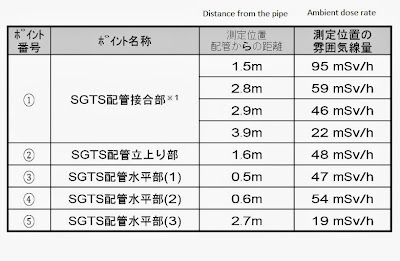TEPCO investigates radiation levels of exhaust stack at Fukushima ...
enformable.com/.../tepco-investigates-radiation-levels-exhaust-st...Dec 6, 2013 - Workers at the Fukushima Daiichi nuclear power plant used a camera attached to a long pole with a dosimeter to explore highlyradioactive ...
Record outdoor radiation level that 'can kill in 20 min' detected at ...
www.freerepublic.com/focus/f-news/3099981/posts
Dec 9, 2013 - TEPCO measured radiation at eight locations around the pipe with the... /tepco-investigates-radiation-levels-exhaust-stacks-fukushima-daiichi/. - Record outdoor radiation level that ‘can kill in 20 min’ detected at Fukushima
rt.com ^ | December 09, 2013 08:56
Posted on 12/9/2013 4:01:50 PM by BenLurkinThe plant’s operator and the utility responsible for the clean-up Tokyo Electric Power Company (TEPCO) detected record radiation levels on a duct which connects reactor buildings and the 120 meter tall ventilation pipe located outside on Friday. TEPCO measured radiation at eight locations around the pipe with the highest estimated at two locations - 25 Sieverts per hour and about 15 Sieverts per hour, the company said.This is the highest level ever detected outside the reactor buildings, according to local broadcaster NHK. Earlier TEPCO said radiation levels of at least 10 Sieverts per hour were found on the pipe.(Excerpt) Read more at rt.com ...
TV: Highest ever radiation levels detected outside reactor buildings ...
enenews.com/tv-highest-ever-radiation-levels-detected-outside-reactor-b...
Dec 7, 2013 - 7, 2013: Record outdoor radiation level detected at Fukushima plant ...per hour was taken on steel piping near an exhaust stack for the No. .... US Doctors annually kill 225,000 American's, FDA Approved drugs kills 100,000+.
FRIDAY, DECEMBER 6, 2013
#Fukushima I Nuke Plant: TEPCO Estimates 25 Sieverts/Hour Radiation at the Bottom of Exhaust Stack for Reactors 1 and 2
Let's get back to Fukushima I Nuclear Power Plant, which feels to be working much better than the National Diet in Tokyo if you don't look very carefully.
Remember the exhaust stack between Reactor 1 and Reactor 2, the bottom of which was found in August 2011 to be emitting extremely high radiation? In fact, it was so high that the dosimeter went overscale at 10 SIEVERTS/Hour on the surface of the pipe (see my post from August 2, 2011).
TEPCO finally did the measurement on November 22, 2013 to find out how high.
The conclusion is that it may be as high as 25 sieverts/hour on the surface of the radiation sources, which TEPCO thinks too (see the above gamma camera photo).
The ambient air dose rates near the location were so high that the measurement was done with what looks like a 20-foot pole.
From TEPCO's Photos and Videos Library, 12/6/2013 (Japanese):
The conclusion is that it may be as high as 25 sieverts/hour on the surface of the radiation sources, which TEPCO thinks too (see the above gamma camera photo).
The ambient air dose rates near the location were so high that the measurement was done with what looks like a 20-foot pole.
From TEPCO's Photos and Videos Library, 12/6/2013 (Japanese):
There are reports by the media and blogs that this 25 sieverts/hour radiation was actually measured. It wasn't. TEPCO measured the ambient air dose rates around the two locations where TEPCO thinks the radiation sources exist, andcalculated the possible radiation level right at the radiation source.
[.1 sievert per hour, 1 sv in a day will nearly kill you]
The highest ambient air dose rate measured was 95 millisieverts/hour, at 1.5 meter from where the STGS (standby gas treatment) pipe is connected to the exhaust stack:
(From TEPCO)
[.1 sievert per hour, 1 sv in a day will nearly kill you]
The highest ambient air dose rate measured was 95 millisieverts/hour, at 1.5 meter from where the STGS (standby gas treatment) pipe is connected to the exhaust stack:
(From TEPCO)


No comments:
Post a Comment